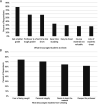Maximizing Academic Integrity While Minimizing Stress in the Virtual Classroom
- PMID: 35496711
- PMCID: PMC9053040
- DOI: 10.1128/jmbe.00292-21
Maximizing Academic Integrity While Minimizing Stress in the Virtual Classroom
Abstract
The article documents students' experiences with the shift online at the onset of the COVID-19 pandemic and provides informed recommendations to STEM instructors regarding academic integrity and student stress. Over 500 students were surveyed on these topics, including an open-ended question. Students experienced more stress and perceived a greater workload in online courses and therefore preferred in-person courses overall. Personal awareness of cheating during online exams is positively correlated with the proportion of cheating a student perceives. Fear of getting caught is the best cheating deterrent while getting a better grade makes cheating most enticing. Randomization of questions and answer choices is perceived as a highly effective tool to reduce cheating and is reported as the least stress-inducing method. Inability to backtrack and time limits cause students the most stress. Students report that multiple choice questions are the least effective question type to discourage cheating and oral exam questions cause the most stress. Use of camera and lockdown browser or being video- and audio- recorded caused the majority of student stress. Yet, nearly 60% agree that the combination of camera and lockdown browser is an effective deterrent. Recommendations: (i) Be transparent regarding academic dishonesty detection methods and penalties. (ii) Use online invigilating tools. (iii) Synchronize exams and (iv) randomize exam questions. (v) Allow backtracking. (vi) Avoid converting in-person exams to online exams; instead, explore new ways of designing exams for the online environment.
Keywords: academic integrity; cheating; exams; online exams; stress; virtual classroom.
Copyright © 2022 Novick et al.
Conflict of interest statement
The authors declare no conflict of interest.
Figures








References
-
- Mervosh S, Swales V. 2020. Colleges and universities cancel classes and move online amid coronavirus fears. The New York Times.
-
- McCabe D. 2015. Cheating and honor: lessons from a long-term research project. In: Bretag T. (ed) Handbook of Academic Integrity. Springer, Singapore.
-
- Passow HJ, Mayhew MJ, Finelli CJ, Harding TS, Carpenter DD. 2006. Factors influencing engineering students’ decisions to cheat by type of assessment. Res High Educ 47:643–684. doi:10.1007/s11162-006-9010-y. - DOI
-
- Hobbs T. 2021. Cheating at school is easier than ever - and it is rampant. The Wall Street J. https://www.wsj.com/articles/cheating-at-school-is-easier-than-everand-i....
LinkOut - more resources
Full Text Sources

